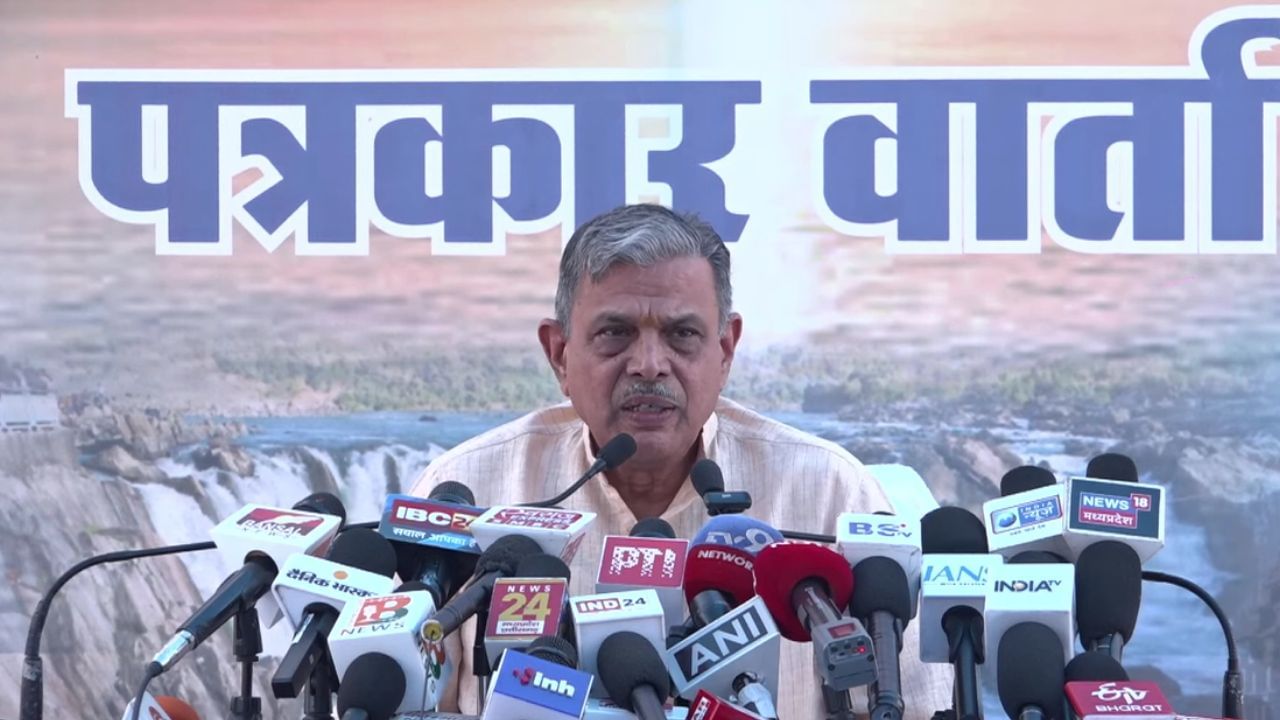Jabalpur, 01 November 2025: On the concluding day of the Akhil Bharatiya Karyakari Mandal Baithak of the Rashtriya Swayamsevak Sangh (RSS), held at Kachnar City, Sarkaryavah Shri Dattatreya Hosabale Ji addressed a press conference. He provided details about the Meeting and the various programs organized across the country on the occasion of Shri Vijayadashami, as part of the Sangh Shatabdi Varsh.
He said that organizing this Meeting in Sanskardhani Jabalpur in Sangh Shatabdi Varsh has permanently inscribed the city’s name in the documented journey of the Sangh.
On the auspicious occasion of Vijayadashami, programs were organized across the nation, including Nagpur. Eminent personalities from the fields of religion, literature, art, and industry extended their greetings on this historic occasion. Shri Hosabale expressed gratitude to lakhs of swayamsevaks and people from various walks of life who have supported the Sangh’s century-long journey of national service.
Vijayadashami programs reflect nationwide spread
The scale of the programs organized across Bharat illustrates the wide spread of Sangh work.
- Out of 59,343 mandals in rural areas, programs were held in 37,250 mandals, with participation from swayamsevaks of nearby mandals – representing 50,096 mandals in total.
- In urban areas, out of 44,686 bastis, 40,220 bastis were represented in the programs.
- In addition, 6,700 independent Vijayadashami programs were organized.
In all, 62,555 Vijayadashami programs took place across the nation. Notably, 80% of these were held on Vijayadashami day itself, while others were conducted before or after due to local circumstances.
Across these programs, 32,45,141 swayamsevaks attended in Ganvesh (uniform). Path Sanchalans were organized at 25,000 locations, with participation of 25,45,800 swayamsevaks in Ganvesh.
These programs reflect the Sangh’s presence across every region of Bharat – from the Andaman Islands to Ladakh, Arunachal Pradesh, Meghalaya, and Nagaland -leaving no geographical area untouched.
The Vijayadashami programs witnessed participation from various community groups. Foreign guests also attended the Nagpur event and later met the Sarsanghchalak Ji and other senior officials in Nagpur and Delhi, expressing their appreciation and best wishes.
Organizational Growth and Expansion
Since the last Meeting held in October last year, the Sangh has initiated work in 10,000 new locations.
Currently, 87,398 daily shakhas are conducted at 55,052 places, which is 15,000 more than the previous year.
In addition, there are 32,362 Saptahik Milans, bringing the total number of activity centers to 87,414.
In recent years, due to focused efforts, Sangh work has expanded across tribal regions, and among labourers, farmers, students, entrepreneurs, and professionals.
Upcoming programs during the Shatabdi Varsh
The Meeting also discussed upcoming programs for the Sangh Shatabdi Varsh, which have already received an encouraging response from society.
Sarkaryavah Ji emphasized that “The Sangh’s work is the nation’s work”. In the coming months, Hindu Sammelans will be organized at the basti and mandal levels. Through these Sammelans, the message of Panch Parivartan will be taken to the grassroots, with an aim to make these principles a part of social behavior and daily life. Saints, scholars, social leaders, and Matru Shakti (women groups) will share their thoughts during these gatherings.
It is estimated that 45,000 rural and 35,000 urban areas hindu sammelans will be held. Additionally, Samaajik Sadvab Baithaks will be organized at the block and city levels, while Prabuddha Nagarik Goshthis will be held at district headquarters.
The goal is to connect more people with national service. Sarkaryavah Ji clarified, “Not everyone needs to join a shakha, but everyone should work in their own field for social unity, harmony, and national progress.” He stressed that the purpose of Shatabdi Varsh programs is not to increase organizational strength, but to awaken the inner strength of society – to inspire awareness, unity, and national dedication.
Three statements released during the Baithak
1. 350th year of Guru Tegh Bahadur Ji’s martyrdom (24 November)
The Sangh paid homage to Guru Tegh Bahadur Ji, the ninth Sikh Guru, on the occasion of the 350th anniversary of his martyrdom. He sacrificed his life to protect religion, culture, and the unity of society.
Sangh karyakartas across the country will participate and organize programs in his memory. “Guru Tegh Bahadur Ji’s life is an inspiration for all. His steadfastness in defending our dharma and culture must be shared with today’s youth.”
2. 150th birth anniversary of Bhagwan Birsa Munda
Bhagwan Birsa Munda, the revered tribal hero, not only fought against British rule but also raised his voice against religious conversions and worked for the development of tribal society.
The Sangh pays its respectful homage and calls upon society to celebrate his 150th birth anniversary with full participation. The Sangh has included Bhagwan Birsa Munda among its Pratah Smaraniya personalities.
3. 150 years of ‘Vande Mataram’
The national song “Vande Mataram” completes 150 years this year.
In 1975, during its centenary, committees were formed across the country to celebrate, but the initiative was halted due to the Emergency. During the freedom struggle, “Vande Mataram” served as a song of inspiration and courage.
Sarkaryavah Ji said, “The present generation should know its inspiring story – Vande Mataram is not merely a song, but the mantra of Bharat’s soul. It reflects Bharat’s identity and cultural spirit.”
Social concerns and national outlook
Positive changes are being seen in Jharkhand and Chhattisgarh, where Naxalites are laying down arms and joining the mainstream.
Regarding Manipur, Shri Hosabale Ji said that though the government there is presently inactive, “better days will soon come”.
He appreciated the Sangh workers who have been working tirelessly on the ground for the past two years to rebuild mutual trust and social harmony.
He also expressed concern over the growing problem of drug abuse among youth.
While Bharat’s youth are advancing in technology and contributing to national development, drug addiction is pushing some backward. Drug sales are increasing in educational institutions – schools and colleges. To curb this, both government and society, including religious organizations, social workers, and community groups, must act together. The Kutumb Prabodhan will play a key role in this effort.
